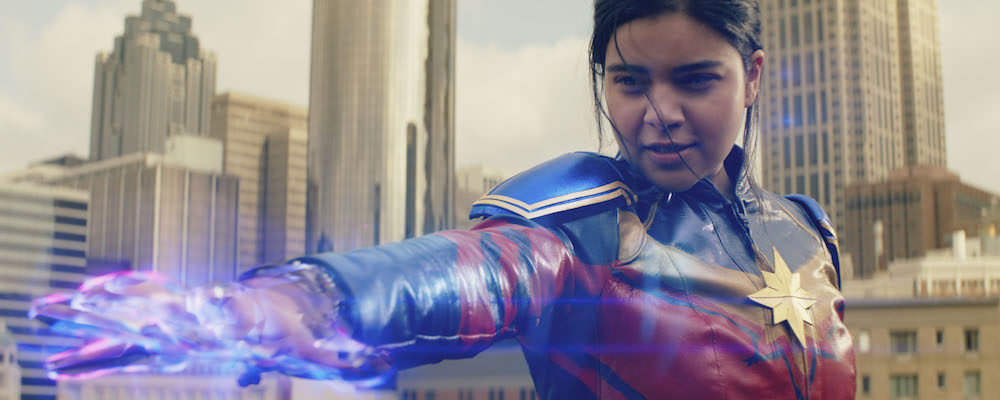‘Ms. Marvel’ Is a Refreshing Entertainment That Breaks New Ground With Its Muslim Superhero
Alci Rengifo
For all the talk of superhero franchises going into overkill and dominating all media, it’s rather hopeful to know some of these major entities are also aware of their cultural power. “Ms. Marvel” is an example of a major brand using its reach to expand representation. Even if it’s within the contours of a costumed franchise, disguised as a YA show, the point is pop culture matters very much. The average viewer, especially young ones, are shaped by what they binge on Disney Plus, and here is a series that uses its platform to introduce a Pakistani-American character, who is also Muslim, into the whole MCU canon. In general this is a very fun show, but buried in the material are rare themes about tradition and culture clash.
Iman Vellani is Kamala Khan, a Pakistani American teenager growing up in Jersey City, New Jersey’s South Asian community. She idolizes Carol Danvers aka Captain Marvel (Brie Larson) and her role in the apocalyptic battle against Thanos, as seen in “Avengers: Endgame.” Kamala makes fan videos and runs a whole social media campaign worshiping her big hero. This is puzzling to her parents, dad Yusuf (Mohan Kapur) and mom Muneeba (Zenobia Shroff), who think their daughter is so promising and sharp, she should be thinking about more serious matters. Her older brother, Aamir (Saagar Shaikh), is following the proper life path and is gearing up to get married. When Kamala wants to attend an AvengerCon convention with school friend Bruno (Matt Lintz), her parents initially refuse, unless she goes with Yusuf, which doesn’t sound fun to a teen. After discovering a strange bracelet once worn by her great-grandmother, Kamala decides to sneak out with Bruno to the convention.
“Ms. Marvel” takes the ingredients of a typical YA series but refashions them for a different angle than what we usually get with such shows. The main character has been part of the Marvel Comics roster since 2013. Creator Bisha K. Ali takes advantage of the TV streaming format to carefully make something entertaining but more insightful. It’s almost like subverting this kind of genre, where we typically see white or stereotypical teenagers dealing with high school woes. “Ms. Marvel” is both a superhero origin story and a portrait of Pakistani-American life through the genre’s lens. Is it corny? Sure. But 20 years ago could we have imagined a major franchise promoting a female Muslim superhero? It’s almost a needed repudiation of the wave of racism and Islamophobia we’ve been living with since the Bush II years, when comic book artists like Frank Miller would be allowed to publish jingoistic fantasies like “Holy Terror” and movies like “300” were the norm. “Ms. Marvel” combines a typical YA visual style with winks at South Asian cinema and animation, generating an energy that never feels stale. At a party Kamala connects with Kamran (Rish Shah) who has a cool car (to Bruno’s noticeable jealousy) and shares a love for Bollywood cinema.
Ali is allowed to express ideas in the show rarely touched on in your average Marvel romp. Kamala is an American teenager dealing with the usual mean girls at school, one of whom gets some well-deserved justice at AvengerCon. But on top of the usual high school hassles, she has parents who love her immensely but apply various forms of pressure. Like many immigrant families, there’s an extreme pressure to succeed in America while still maintaining certain cultural norms. Certain pastimes are seen as childish because one must focus on academic and social perfection. These are themes relatable to viewers from many other communities from the Middle East, Latin America and Asia. Muneeba lambasts Kamala for wanting to wear a “tight, skimpy” dress like her Captain Marvel costume. The idea of her going alone with Bruno to an event sounds outrageous to them, even if he’s a genuine buddy. Like Disney’s recent and great “Turning Red,” this story is told with a female voice that doesn’t shy away from being upfront and challenging. At their local mosque, Kamala’s other close friend, Nakia (Yasmeen Fletcher), decides to defy the patriarchal system and run for the mosque’s council.
Comic books and their adaptations always have fun mixing real history with their narratives. We like to imagine Captain America was facing off with the Red Skull during World War II. “Ms. Marvel” makes references to the partition of India and Pakistan, which is when Kamala’s great grandmother disappeared. We can already guess this backstory will somehow connect to the bracelet which she soon discovers holds great power, but that’s the nature of these stories. What is essential is that Marvel is now telling this story within its framework. It proves there’s room for genuine characters from any corner of society in the same way “Black Panther” and “Shang-Chi and the Legend of the Ten Rings” opened new doors in mass box office representation. When it comes to the Marvel shows, this one is also notable for how entertaining it is without needing to resort to super powers and cosmic villains every two seconds. Most of the first two episodes are enjoyable simply by following around Kamala and her search for independence and identity. The expected special effects and brushes with danger only add to the fun of a show that is doing the needed work of pop art kicking down a door or two.
“Ms. Marvel” begins streaming June 8 with new episodes premiering Wednesdays on Disney+.

